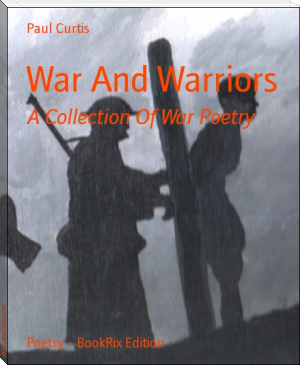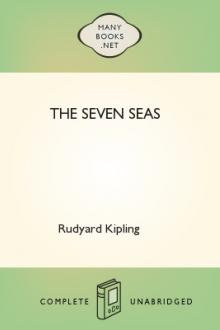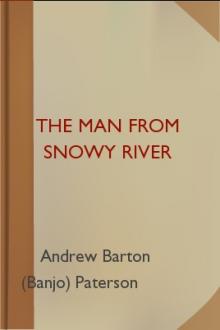War And Warriors - Paul Curtis (top ten books to read .txt) 📗

- Author: Paul Curtis
Book online «War And Warriors - Paul Curtis (top ten books to read .txt) 📗». Author Paul Curtis
ISANDHLWANA
In eighteen hundred and seventy nine
The British marched in ordered line
A January morning on the eleventh day
Over the Buffalo River they made their way
The British force Lord Chelmsford led
As on Zulu land his troops did tread
The Zulu king sees this as an act of war
With broken word and broken law
Lord Chelmsford then his force divided
General Pulliene to make his camp decided
At Isanhlwana the British camp was made
Pickets and defenses set against a Zulu raid
But after eleven days in the Zulu’s land
The British had to make their stand
The warriors then the camp surround
After exploiting any weakness found
The Zulu impi many thousands strong
Defeat the British in the ensuing throng
Over seventeen hundred souls are lost
As after the battle they count the cost
Also countless numbers of Zulu’s dead
How many wives and children left unfed?
An organized army of foot and horse
Suffers the worst defeat by a native force
FOREIGN FIELDS
In the flower of youth cut down
Pals in regiments from every town
Sent to fight in the Nations name
Sent to die to the General’s shame
On foreign fields a generation falls
Heroes for whom the last post calls
Heroes sent to fight across the seas
Names now whispered on the breeze
Gathered as the bell of tribute tolls
Now call with pride the honor rolls
PRIVATE FREDERICK HITCH V.C.
November 29th 1856 - January 5th 1913
Frederick Hitch was born a shoemaker’s son
In Southgate, a hamlet to the north of London
It was eighteen fifty-six on a November day
Born to a large Victorian family as was the way
Fred didn’t wish to follow in his father’s trade
So as a builders laborer his way was made
But when he was barely twenty years of age
He was finding it tough to earn a decent wage
So to petty crime as extra income he sought
But he soon found himself up before the court
To the judge he pleaded guilty for his crime
His sentence join the army or serve prison time
A Victorian prison was the harshest punishment
So as hobsons choice he chose to join a regiment
Two days later private Frederick Hitch was put
In the 2nd Battalion of the 24th Regiment of Foot
Very soon they were on their way to South Africa
And they all set sail on the Troopship Himalaya
Reaching Simon's Bay and East London town
They were sent on trains to King William's Town
This was known locally as "White Man's Grave".
The regiment marched from here for several days
To find the Galekas and the rebellion crush
Soon they skirmished in the dense Petrie Brush
There were further battles on that day before
Chief Sandili was defeated in the last, Kaffir War.
For several months stationed at Mount Kempt
There were few things, for a young man to temp
It was a tough way of life to earn a penny a day
But Fred still sent some home to mother anyway
By this time the Zulu nation had reached its peak
No other African tribes had any strength to speak
Only the “red soldiers” could ever be a threat
And soon the 24th foot would there orders get
Lord Chelmsford led the army to the other side
To wage a war across the buffalo river wide
Defeat at Isandhlwana and Chelmsfords shame
Then too Rorkes Drift the victorious Zulu’s came
At the drift a hospital and Swedish mission stood
To be defended by only a few if they could
Less than one hundred and fifty made the stand
To fight the Zulu impi of more than four thousand
Young private Frederick Hitch was one such man
Who with his comrades stood fast and never ran
Fred was ordered to the roof to act as a lookout
Firing the first three shots at the enemy without
During the fray comrade’s fell to left and right
As wave upon wave of warriors came to fight
Private hitch was shot through his shoulder blade
And a comrade helped him as his dressing made
Doing his best to help his soldier brothers
He then began serving ammunition to the others
Then exhaustion washed over him like a flood
And finally he collapsed from loss of blood
He awoke confused finding himself in a stable
With victory won and awaiting the surgeon table
After Durban hospital care neath the southern star,
He was finally sent home aboard the ship Tamar
He was at Netley Hospital on his return to England
His Victoria Cross was given by Victoria’s own hand
But yesterdays hero was tomorrows unemployed
A medical boards decision Fred could not avoid
Unfit for duty and discharged from his regiment
With his medal and a pension he had to be content
In July of eighteen eighty one he married Emily
They move to Portchester Square to raise a family
Working at the Imperial Institute as Commissionaire
His V.C. was stolen while his tunic hung on a chair
After twenty years and just as many occupations
Fred with his family growing changed vocations
He invested in a hackney carriage and horse
Then a little later he owned a motor car of course
Fred finally received his replacement Victoria Cross
Three pounds, seven shillings and sixpence the cost
Only the second person ever to receive a duplicate
But the first to be charged a fee even to this date
On January 5th 1913 Fred Hitch died in his sleep
Leaving behind eight children and a wife to weep
At his funeral his coffin on gun carriage borne
With dignity and reverence the people mourn
Thousands came despite the cold and the biting rain
To say goodbye to the hero and remember him again
The gun carriage was flanked by Army outriders
Fred's cab came next manually pulled by taxi drivers
A boy scouts troop and the Chiswick firefighters
And a firing party from the South Wales Borderers
Two thousand cab drivers bringing up the rear
Respects and Tributes to pay from far and near
A memorial was erected to mark Fred’s Grave
At Chiswick cemetery befitting a soldier brave
On top of granite block some seven-foot in height
The Union Jack carved with a sun helmet in site
The helmet bears the badge of Hitch's old regiment
Finally in bronze the cross and palm leaf represent
After more than eighty five years of standing sentinel
The magnificent monument fell victim to a criminal
The memorial found vandalized when visitors went
Even the sun helmet stolen that adorned the monument
Also years had left stonework lackluster on the edifice
And the once bright bronze work tainted by verdigris
Thanks to Chiswick Council and the British Legion
The monument restored and fit for rededication
In Nineteen ninety nine on Rorkes Drifts day of glory
The gathered crowd remembers the Fred Hitch story
VASSILI THE WOLF HUNTER
Vassili Zaitsev was a legendary Russian sniper at the siege of Stalingrad
German soldiers on the whole did not know the name of this mountain lad
He set fear and dread into the invaders hearts with his cold hunters eye
And no German soldier in his sights was safe beneath the harsh winter sky
The political commissars tried to turn him into a hero of the Russian peoples
But Vassili saw himself simply as the young wolf hunter from the Urals
Despite the propaganda his record shows he went about his work without pity
His kills reaching two hundred and forty two during the siege of the city
It can only be surmised what impact his deeds had on the battles out come
Just the knowledge of his existence would have instilled real fear in some
His actions certainly affected the efficiency of the German war machine
To the average foot soldier young Vassili represented their doom unseen
The Germans called on an SS Colonel Thorvald to cancel out the Russian
But Vassili Zaitsev was triumphant out foxing the wily German marksman
His success deprived the Nazis the freedom of movement within Stalingrad
So young Vassili the wolf hunter from the Ural Mountains didn’t do too bad
THE NOT SO GREAT WAR
“Your country needs you,” said Kitchener
You’re needed to fight them over there
“It will be over by Christmas,” they said
But it was just getting started instead
In the cold trenches on Christmas morn
The guns remained silent after the dawn
Soon forgetting the horrendous conditions
Men began emerging from their positions
The opposing soldiers met in no mans land
Then smiled and shook their enemies hand
Briefly at peace both sides felt regrets
Then they exchanged gifts of cigarettes
A day without a single shot fired at all
They even got to play a game of football
Sadly the men returned their own way
They began killing again on Boxing day
THE LAST DAWN
On the horizon the eastern sky was lightening
But the over cast skies were not brightening
The dawn had little effect on the Grey sky
It was certainly a miserable morning to die
The sounds of the long range guns was absent
And the chorus of birdsong had not been vent
Just the cloud scudding across the murky sky
It was certainly a peaceful morning to die
The young soldier was led out in the silence
To face the firing squad to serve his sentence
The last cigarette signaled the end was nigh
What an undignified manner in which to die
The young man wanted to face his fate bravely
If he must die then he would do so with dignity
He would meet his maker with head held high
Though it was such an ignominious way to die
He did not run away and he was not a deserter
Nor a coward and could not be called traitor
But still he stood blindfold neath the dawn sky
In battle would have been a better way to die
His crime was to be blown over by an explosion
To lose his weapon and to suffer a concussion
His only visible injury was a cut above his eye
Its ironic really he was very lucky not to die
He was found wandering out of no mans land
Half senseless and with no weapon in his hand
His only injury was just that cut above his eye
It really is ironic how lucky he was not to die
Little did he know as he marched proudly away
What would become of him on a cold Grey day
When he kissed his love and then said goodbye
Little did he know how he would come to die
Crying out in fear is what filled him with dread
Before the shot was heard he was already dead
A new dawn breaking under the slate Grey sky
Why exactly did this young soldier have to die?
History would show that he was without blame
A young soldier no longer associated with shame
In the war to end all wars this you cannot deny
To be shot at dawn was a ridiculous way to die
THE TREATY
pauls june 2006
The eleventh hour
The T’s were crossed
And the I’s





Comments (0)